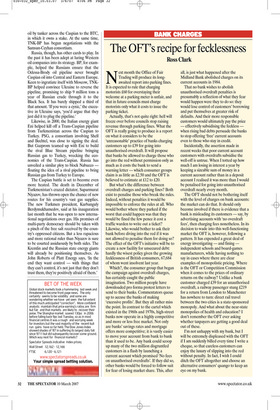The OFT’s recipe for fecklessness
Ross Clark
Next month the Office of Fair Trading will produce its longawaited report into parking fines. It is expected to rule that charging motorists £60 for overstaying their welcome at a parking meter is unfair, and that in future councils must charge motorists only what it costs to issue the parking ticket.
Actually, that’s not quite right: hell will freeze over before councils stop raising revenue through parking fines. What the OFT is really going to produce is a report on what it considers to be the ‘unreasonable’ practice of banks charging customers up to £39 for going into unauthorised overdraft. It will propose that banks be allowed to charge those who go into the red without permission only as much as it costs the bank to send a warning letter — which consumer groups claim is as little as £2.50 and the OFT is believed to estimate at £12 to £20.
But what’s the difference between overdraft charges and parking fines? Both exist to penalise those who break the rules. Indeed, without penalties it would be impossible to enforce the rules at all. Who would bother where they parked if the worst that could happen was that they would be fined the few pence it cost a traffic warden to write out a ticket? Likewise, who would bother to ask their bank before diving into the red if it was not allowed to penalise them for doing so? The effect of the OFT’s initiative will be to create a new facility for unsecured debt: hardly the wisest policy given the growing fecklessness of British consumers, 67,684 of whom went insolvent last year.
Which?, the consumer group that began the campaign against overdraft charges, has certainly caught the public imagination. Two million people have downloaded pro forma protest letters to send to their banks. Commentators queue up to accuse the banks of making ‘excessive profits’. But they all rather miss the point. In contrast to the cartel which existed in the 1960s and 1970s, high-street banks now operate in a highly competitive and more or less free market. Not only are banks’ savings rates and mortgage offers more competitive; it is vastly easier to move your account from bank to bank than it used to be. Any bank could scoop up many of the two million disgruntled customers in a flash by launching a current account which promised ‘No fees on unauthorised overdrafts’. If they did so, other banks would be forced to follow suit for fear of losing market share. This, after all, is just what happened after the Midland Bank abolished charges on its current accounts in 1984.
That no bank wishes to abolish unauthorised overdraft penalties is presumably a reflection of what they fear would happen were they to do so: they would lose control of customers’ borrowing and put themselves at greater risk of defaults. And their more responsible customers would ultimately pay the price — effectively subsidising the feckless when rising bad debts persuade the banks to stop offering ‘free’ current accounts even to those who stay in credit.
Incidentally, the assertion made in recent weeks that poor current account customers with overdrafts subsidise the well-off is untrue. When I totted up how much I am losing in interest a year by keeping a sizeable sum of money in a current account rather than in a deposit account I realised it was more than I would be penalised for going into unauthorised overdraft nearly every month.
The OFT should not be bothering itself with the level of charges on bank accounts: the market can do that. It should only become involved if there is evidence that a bank is misleading its customers — say, by advertising accounts with ‘no overdraft fees’, then charging fees nonetheless. In its decision to wade into this well-functioning market the OFT is, however, following a pattern. It has expended a great deal of energy investigating — and fining independent schools and board-games manufacturers, while having nothing to say in cases where there are clear examples of monopolistic pricing. Where is the OFT or Competition Commission when it comes to the prices of ordinary returns on the railway? Unlike a bank customer charged £39 for an unauthorised overdraft, a railway passenger stung £219 for a return from London to Manchester has nowhere to turn: direct rail travel between the two cities is a state-sponsored monopoly. And what about the near-state monopolies of health and education? I don’t remember the OFT ever asking whether taxpayers are getting a good deal out of these.
I’m not unhappy with my bank, but I will be extremely displeased with the OFT if I am suddenly billed every time I write a cheque, so that careless customers can enjoy the luxury of slipping into the red without penalty. In fact, I wish I could ditch the OFT altogether and choose an alternative consumers’ quango to keep an eye on my bank.


























































































 Previous page
Previous page